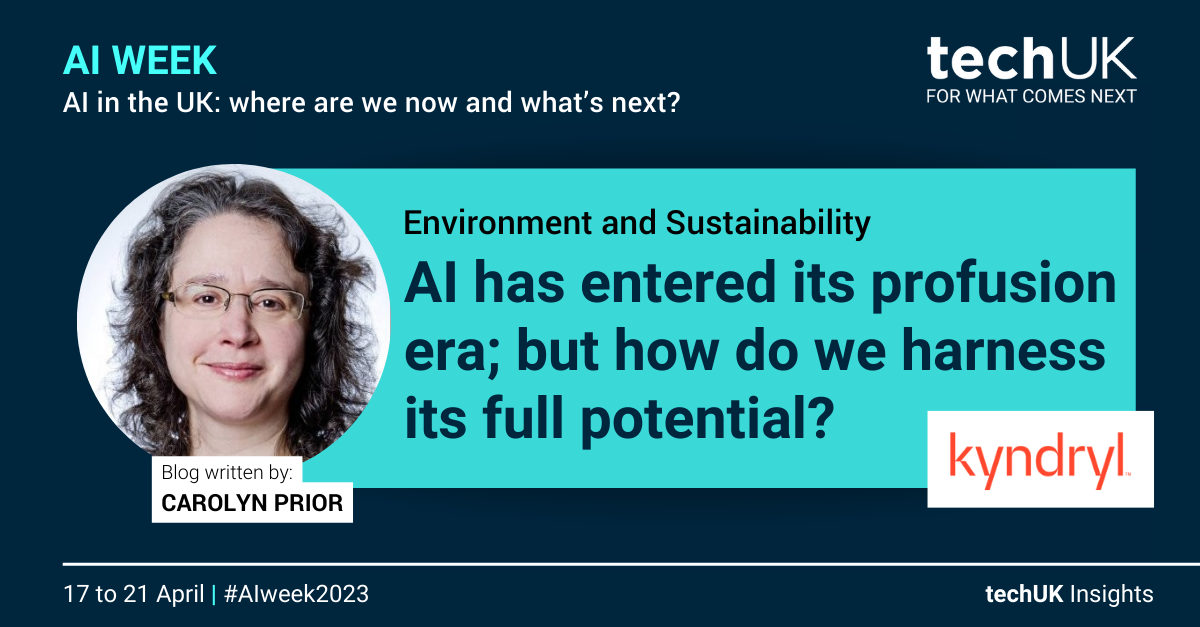AI has entered its profusion era; but how do we harness its full potential? (Guest blog by Kyndryl)
The advent of Artificial intelligence (AI) has changed the face of the technological ecosystem and is unlocking unprecedented opportunities for innovation in the UK and across the globe. The anticipated economic benefits over this past decade alone are significant, and PwC predicts that the UK’s GDP will be up to 10% higher in 2030 from the development and adoption of AI.
The UK Government’s National AI Strategy acknowledges the vital role that AI will play in the UK’s efforts to build economic resilience, productivity, growth and innovation across the public and private sector. As with all technologies with great promise, however, AI is not without its complications.
Barriers to greater AI adoption
The UK is currently amid an innovation curve, where there is a lot of hype around AI technology but also a lot of scepticism. Many companies have implemented AI pilot programmes, but the challenge lies in delivering AI at scale. In the same way organisations should invest time to train and upskill employees, we need to invest in AI to achieve the best outcomes.
AI needs to be fed with data, and it’s critical that it is fed clean, quality data from its infancy. Accessing high quality data is often easier said than done, however, as the way data is stored is dependent on the technology used at the time. Whether it’s via mainframes, PCs or cloud, the data is often siloed by technology and often by line of business too, making it difficult for organisations to access.
In addition to the logistical challenges AI adoption poses, there remains a lack of public trust in the technology, too. To ensure AI is trustworthy, it needs to be ethical, explainable and sustainable. From an ethics perspective, we need to pre-empt and remove any bias in the AI’s programming so its development remains neutral. We need to regularly revisit assumptions and AI outcomes ensuring no new issues of bias or trust have developed.
Often, learning about the AI’s decision-making process is more valuable than the outcome itself. This insight, understanding how the AI has arrived at its results, can encourage new ways of thinking which is extremely valuable. We can’t fall into the trap of assuming the AI is right about everything, so the process must be explainable. Lastly, AI needs to be sustainable by design. We need to mature disciplines and practices which will permit enterprises to scale AI sustainably and build on their investments, rather than constantly re-inventing at additional cost.
Leveraging AI for business
One way organisations can overcome the challenge of scaling their AI programmes is by utilising DataOps, an agile approach to designing, implementing and maintaining a distributed data architecture that will support a wide range of open source tools and frameworks in production. DataOps will help organisations not only to scale but to democratise data consumption and ensure a reliable output for consumers.
Responsible AI solutions – that address trust, risk, ethics, security, transparency – will gradually begin to become more mainstream. Solutions that target personalised insights, whether it is related to aspects such as credit risk, underwriting or simply recommendation engines for dynamic pricing will become commonplace.
Take the retail industry, for example. Faced with high inflation rates, continued staffing shortages and an increasingly digitised world, retailers are seeking new ways to attract and retain consumers. Live scan and intelligent dressing rooms that provide customers with “try-before-you-buy” options are just two ways that AI can revitalise retail and meet consumer expectations for instant response. AI can also help retailers streamline last-mile delivery services, enabling faster deliveries in real-time. GPS technology and machine learning (ML) capabilities can combine to offer the best delivery solutions even before the customer places an order.
Future applications of AI
Personalised insights driven by AI will extend beyond retail across all major industries, transforming business processes the world-over. Insurance companies, for example, will use AI to transform how cars, homes, businesses, and individuals are insured within highly flexible programs. This focus will include dynamically and automatically adjusting coverage and making sure it’s optimised and personalised at any given moment.
Leveraged correctly, AI could help solve some of the biggest challenges of our time, from economic turmoil to climate change, with two-thirds (66%) of companies either currently executing or planning to apply AI to address their sustainability goals. Perhaps the biggest barrier to adoption and our own progress is not scalability or data quality, it is our own uncertainty. If we can build AI solutions that are ethical, explainable and sustainable, the potential for this technology is unprecedented.

AI and Data Analytics updates
Sign-up to our monthly newsletter to get the latest updates and opportunities from our AI and Data Analytics Programme straight to your inbox.

